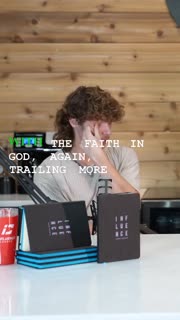Faithful Efforts: Authenticity and Impact in Christian Life
Devotional
Sermon Summary
Bible Study Guide
Sermon Clips
1. "Sometimes I'm a Judas. Sometimes I'm a Peter. I don't know. It depends. But oftentimes I feel like the little boy with the fishes and the loaves. Because I just try to do so much with the little things I have sometimes. And sometimes it can be, because I think about the little guy and how it, you know, it was probably pretty difficult to like just give this guy some fish and like, you know, the only food he had. But then to see that multiplied like crazy. I feel like sometimes I see that working through my life." [04:16] (32 seconds)
2. "But what I've noticed is that, you know, changing my world, my little world, the people around me. Just doing the little things is oftentimes... Creating a bigger impact. And creating even a ripple effect, as we call it. And you can see that spread through a lot. And so, yes, you can change the world by, you know, being the pastor. And doing all the big things." [09:07] (23 seconds)
3. "And preaching on Sunday to, you know, thousands if the church is that big. Or maybe you're a pastor of a smaller church like we have. And it's only, you know, a couple people. But that has, I believe, just as much of an impact. It might not be as mass of an impact, but it's as important of an impact. And oftentimes, when you're more heart-to-heart, you'll have more of an impact on the individual. And that can ripple to others." [09:07] (30 seconds)
4. "We simply can't, you know, we should not be relying on our own understanding and instead leaning on God as much as we can. Because even the information we get, you know, half the time is fake. It's not even, you know, real or... It is kind of genuine, but then we evolve on that, and then we find new things that actually change what we did think." [11:44] (20 seconds)
5. "So specifically on information, I think for me specifically, is to just take a step back. Because we keep on seeking and seeking, and we're going down this rabbit hole to find everything. And we just can't bear the weight of not knowing something. And I find by taking a step back and looking, like, I know nothing. And then once you realize that you know nothing and you never will know anything, like, that's, it kind of gets you out of that loop." [13:00] (30 seconds)
6. "With the faith in God, again, trailing more heavily on this information topic, it can free you from the chains of, like, just not knowing and the pressure to know everything. Because I see a lot of people are know-it-alls that know nothing. And so it's an oxymoron, and it's just kind of funny. Sometimes you can catch them. Yeah. But sometimes there's just not, like, you know nothing, right? So you just... Maybe they're right, maybe they're wrong. Who knows? And faith in God, like, you not only understand that you know nothing, but it's okay that you know nothing. You know what you know, and you can learn and grow. And seeking more information is a good thing. But to know that God is enough is the ultimate freedom." [16:11] (56 seconds)
7. "And I think of Sundays, like you were kind of saying, not to just be holy on Sunday and to just carry it throughout the week. I know a bunch of people who have church hurt. Because of that. Because of the fakeness in the church. Like one of my buddies, he was talking about how, you know, he used to go to church as a kid, and it was great. And he had a great group of friends, and they were so good. However, he slowly learned and figured out that they were pretty much faking and lying the entire time. And there, there's no consistency in their life." [22:44] (34 seconds)
8. "And so I'd say be you, you know, as best you can, right there, we do need to change as individuals, because of sin. However, God made us all uniquely and amazingly. So be you and then be you consistently. Like don't show up to church and then talk all godly, and then go home and not talk, you know, as godly and not think as godly, you know, try not to open your Bible one day a week. Trying to, you know, read it as much as you can, trying to get in there." [22:44] (31 seconds)
9. "I find it funny that Sundays, the day that, you know, that's kind of like supposed to be the holy day, is oftentimes the most faked day we have of the week. Wow. It's the most unholy day we realistically have because everyone's faking it. And sometimes as Christians, we don't even see it. We walk around and everyone's like, oh, everyone's, you know, full, so full of the Holy Spirit. And so, you know, great. And everyone's so nice around here and so amazing. And they're all, you know, just so special. They're so spiritual." [23:43] (30 seconds)
10. "And then I think of the people I know that have gone through the church and seen the fakeness. And I bet that they walk into the church and they notice it right away. Like it's like a dollar bill that's printed on one side. And all they do is they just flip it over. It's like, no, it's a fake bill. But then us, we're like, oh, it's real. Look at it. Yeah, it's just it's just fake. Wow. It's like if you got your little bowl of apples or whatever on the counter and they're all plastic. And on Sunday we try to take a bite and it's just plastic there. There's nothing there." [24:41] (52 seconds)
Ask a question about this sermon
2. "But what I've noticed is that, you know, changing my world, my little world, the people around me. Just doing the little things is oftentimes... Creating a bigger impact. And creating even a ripple effect, as we call it. And you can see that spread through a lot. And so, yes, you can change the world by, you know, being the pastor. And doing all the big things." [09:07] (23 seconds)
3. "And preaching on Sunday to, you know, thousands if the church is that big. Or maybe you're a pastor of a smaller church like we have. And it's only, you know, a couple people. But that has, I believe, just as much of an impact. It might not be as mass of an impact, but it's as important of an impact. And oftentimes, when you're more heart-to-heart, you'll have more of an impact on the individual. And that can ripple to others." [09:07] (30 seconds)
4. "We simply can't, you know, we should not be relying on our own understanding and instead leaning on God as much as we can. Because even the information we get, you know, half the time is fake. It's not even, you know, real or... It is kind of genuine, but then we evolve on that, and then we find new things that actually change what we did think." [11:44] (20 seconds)
5. "So specifically on information, I think for me specifically, is to just take a step back. Because we keep on seeking and seeking, and we're going down this rabbit hole to find everything. And we just can't bear the weight of not knowing something. And I find by taking a step back and looking, like, I know nothing. And then once you realize that you know nothing and you never will know anything, like, that's, it kind of gets you out of that loop." [13:00] (30 seconds)
6. "With the faith in God, again, trailing more heavily on this information topic, it can free you from the chains of, like, just not knowing and the pressure to know everything. Because I see a lot of people are know-it-alls that know nothing. And so it's an oxymoron, and it's just kind of funny. Sometimes you can catch them. Yeah. But sometimes there's just not, like, you know nothing, right? So you just... Maybe they're right, maybe they're wrong. Who knows? And faith in God, like, you not only understand that you know nothing, but it's okay that you know nothing. You know what you know, and you can learn and grow. And seeking more information is a good thing. But to know that God is enough is the ultimate freedom." [16:11] (56 seconds)
7. "And I think of Sundays, like you were kind of saying, not to just be holy on Sunday and to just carry it throughout the week. I know a bunch of people who have church hurt. Because of that. Because of the fakeness in the church. Like one of my buddies, he was talking about how, you know, he used to go to church as a kid, and it was great. And he had a great group of friends, and they were so good. However, he slowly learned and figured out that they were pretty much faking and lying the entire time. And there, there's no consistency in their life." [22:44] (34 seconds)
8. "And so I'd say be you, you know, as best you can, right there, we do need to change as individuals, because of sin. However, God made us all uniquely and amazingly. So be you and then be you consistently. Like don't show up to church and then talk all godly, and then go home and not talk, you know, as godly and not think as godly, you know, try not to open your Bible one day a week. Trying to, you know, read it as much as you can, trying to get in there." [22:44] (31 seconds)
9. "I find it funny that Sundays, the day that, you know, that's kind of like supposed to be the holy day, is oftentimes the most faked day we have of the week. Wow. It's the most unholy day we realistically have because everyone's faking it. And sometimes as Christians, we don't even see it. We walk around and everyone's like, oh, everyone's, you know, full, so full of the Holy Spirit. And so, you know, great. And everyone's so nice around here and so amazing. And they're all, you know, just so special. They're so spiritual." [23:43] (30 seconds)
10. "And then I think of the people I know that have gone through the church and seen the fakeness. And I bet that they walk into the church and they notice it right away. Like it's like a dollar bill that's printed on one side. And all they do is they just flip it over. It's like, no, it's a fake bill. But then us, we're like, oh, it's real. Look at it. Yeah, it's just it's just fake. Wow. It's like if you got your little bowl of apples or whatever on the counter and they're all plastic. And on Sunday we try to take a bite and it's just plastic there. There's nothing there." [24:41] (52 seconds)










